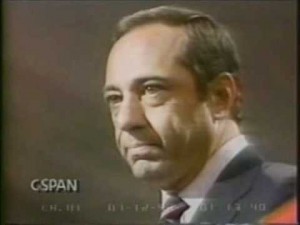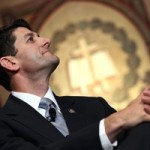 Coming out of the morass of the 70s, with its failed socialistic projects and broken economy, Jack Kemp, mentor to Paul Ryan, touted programs that encouraged excellence. Kemp was a hero in my home growing up — as I mentioned in my earlier post, my father did similar work. Proposals abounded for voucher programs, magnet schools, privatizing social services to make them more efficient. As Frank Schaeffer spells out from his personal experience in the post “Worshipping at the Altar of Ayn Rand’s Undeserving Elite (Ryan is No Kemp),” supply side economics made the plausible promise of lifting up all boats, rich and poor, by growing the economy, and Jack Kemp’s heart was totally in the right place.
Coming out of the morass of the 70s, with its failed socialistic projects and broken economy, Jack Kemp, mentor to Paul Ryan, touted programs that encouraged excellence. Kemp was a hero in my home growing up — as I mentioned in my earlier post, my father did similar work. Proposals abounded for voucher programs, magnet schools, privatizing social services to make them more efficient. As Frank Schaeffer spells out from his personal experience in the post “Worshipping at the Altar of Ayn Rand’s Undeserving Elite (Ryan is No Kemp),” supply side economics made the plausible promise of lifting up all boats, rich and poor, by growing the economy, and Jack Kemp’s heart was totally in the right place.
Despite what some of the commenters on my earlier piece critical of Paul Ryan’s Ayn Rand connection assume (without any knowledge), I was right there with Kemp and Schaeffer. In 1980, I was not a Reagan Democrat; I was a Reagan Republican. I believed wholeheartedly in rolling back the welfare state. But also, I lived in New York City. One of the things I have always loved about New York City is that — though less true today than in the past — all classes and groups mix on the streets. There are few gated communities. By 1984 in New York, while most of the nation was celebrating the economic boom, grateful for a chance to be optimistic, I saw that it was not really working — I saw the out-of-control homelessness and the rising anxiety of the lower working class and poor. This, for me, began a lengthy period outside the two-party system.
But, there was a Democratic leader who warned the rising tide was not lifting all boats. He saw the growing income disparity and those left behind. I wasn’t paying much attention because I’d already given up on the Democrats, but while his party presented the lackluster Walter Mondale as a hopeless counter to Reagan’s second term bid, then-New York governor and presumptive future Presidential candidate Mario Cuomo’s convention keynote address offered a more inspiring alternative. The other day, a friend reminded me of this speech, and pointed out how much of it applies once again.
Of course, both because of Cuomo’s bias and because this was a convention speech, it’s laced with praise for the Democratic Party which I don’t share, and applying it to today the roles are confused, with the presidency and poor economy in Democratic hands. But his central themes about future direction are as true today as they were then in drawing contrast with the Randian Republican view, touted then by Jack Kemp, and now by his former aide, Paul Ryan. The full audio is linked here, and following are a few excerpts.
I offer this not because I agree with every word, but because I think this is a conversation we need to be having. What kind of country do we want to be? What kind of people?
http://www.youtube.com/watch?v=FQGKdD8OViQPresident Reagan told us from the very beginning that he believed in a kind of social Darwinism. Survival of the fittest. “Government can’t do everything,” we were told, so it should settle for taking care of the strong and hope that economic ambition and charity will do the rest. Make the rich richer, and what falls from the table will be enough for the middle class and those who are trying desperately to work their way into the middle class.
You know, the Republicans called it “trickle-down” when Hoover tried it. Now they call it “supply side.” But it’s the same shining city for those relative few who are lucky enough to live in its good neighborhoods. But for the people who are excluded, for the people who are locked out, all they can do is stare from a distance at that city’s glimmering towers.
It’s an old story. It’s as old as our history… We Democrats believe in something else. We Democrats believe that we can make it all the way with the whole family intact, and we have, more than once.
Surely the Republicans won’t bring this country together. Their policies divide the nation into the lucky and the left-out, into the royalty and the rabble. The Republicans are willing to treat that division as victory. They would cut this nation in half, into those temporarily better off and those worse off than before, and they would call that division recovery.
We believe in a government strong enough to use words like “love” and “compassion” and smart enough to convert our noblest aspirations into practical realities. We believe in encouraging the talented, but we believe that while survival of the fittest may be a good working description of the process of evolution, a government of humans should elevate itself to a higher order.
Our government should be able to rise to the level where it can fill the gaps that are left by chance or by a wisdom we don’t fully understand. We would rather have laws written by the patron of this great city [San Francisco], the man called the “world’s most sincere Democrat,” St. Francis of Assisi, than laws written by Darwin.
We believe as Democrats, that a society as blessed as ours, the most affluent democracy in the world’s history, one that can spend trillions on instruments of destruction, ought to be able to help the middle class in its struggle, ought to be able to find work for all who can do it, room at the table, shelter for the homeless, care for the elderly and infirm, and hope for the destitute.
We believe in a single fundamental idea that describes better than most textbooks and any speech that I could write what a proper government should be: the idea of family, mutuality, the sharing of benefits and burdens for the good of all, feeling one another’s pain, sharing one another’s blessings — reasonably, honestly, fairly, without respect to race, or sex, or geography, or political affiliation.
We believe we must be the family of America, recognizing that at the heart of the matter we are bound one to another, that the problems of a retired school teacher in Duluth are our problems; that the future of the child in Buffalo is our future; that the struggle of a disabled man in Boston to survive and live decently is our struggle; that the hunger of a woman in Little Rock is our hunger; that the failure anywhere to provide what reasonably we might, to avoid pain, is our failure.












